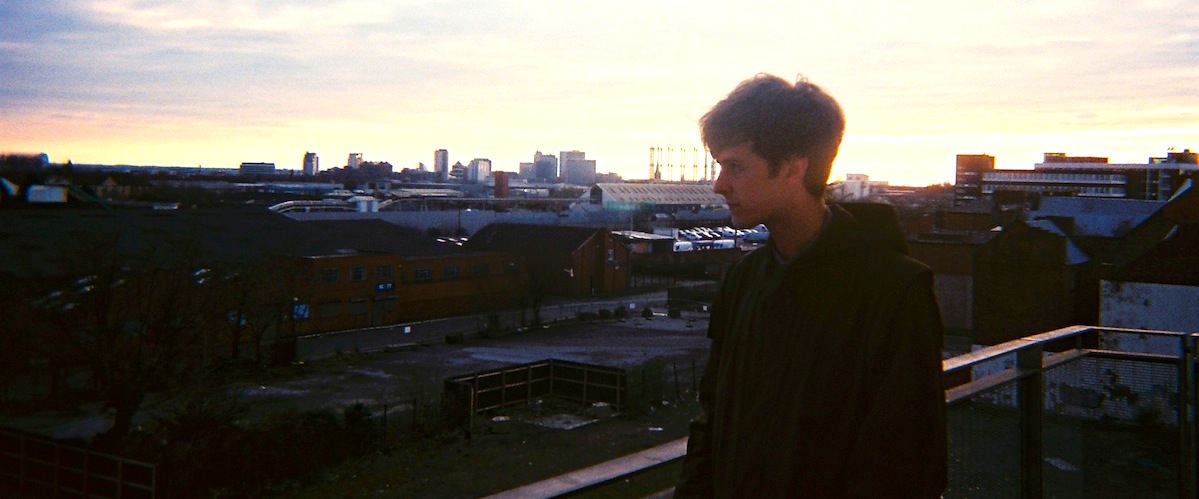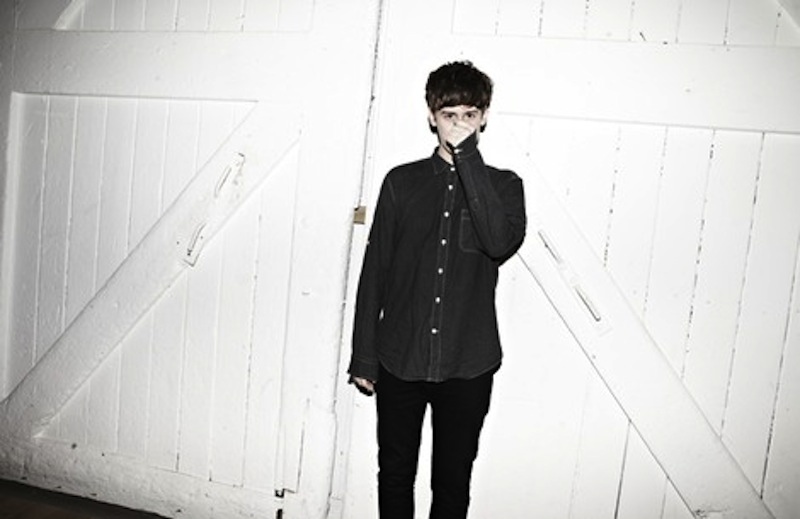Bubblin’ Up: Howes
Possesed circuits and luminous phantasms: A young modular-loving producer releases a debut LP brimming with rich, phantasmical rhythms.

Bubblin’ Up: Howes
Possesed circuits and luminous phantasms: A young modular-loving producer releases a debut LP brimming with rich, phantasmical rhythms.

It’s so easy to boot up a computer and decide you’re a musician in 2016; there’s software to make budding beatsmiths of the most sonically inexperienced. One consequence of this technology, though, is that so much sounds the same. Producers are on rails, stuck in templates and working in rigid constraints. Not so Salford, Manchester’s 22-year-old John Howes—or simply Howes, as he’s known through his releases for the city’s well-regarded Melodic stable.
Howes’s eerie, deeply hypnotic music is all composed with a modular-synth setup, a constant dialog between the man and his machine. Recording everything to cassette tapes, his tunes are culled and edited from late-night jam sessions, with the synth sounds mutating and evolving over time, taking on a life of their own.
Oscillators warm up and the tone of the sound changes; parameters are automated with software controllers, and a ghost possesses the circuits. Listen to “Source 000535” from his debut album 3.5 Degrees (coming out on January 22) and you can almost see luminous phantasms shimmering and emerging from the crackling waves and gentle hiss of the tape. “Overeen” is all 4/4 beats and distant bell-like textures—it’s something closer to techno, but from deep in the left-field, speaking of his clubbing roots and subsequent drift towards more experimental forms.
He started out making house and techno with software sequencers, but grew tired of the hedonistic aspect of club culture as he became dissatisfied with the limitations of a DAW. You can see his music in the tradition of Border Community, Hieroglyphic Being, Cosmin TRG and Ital—but right now the sounds he’s making are quite unlike anyone else. And that, says Howes, is the way he prefers it. XLR8R dialed his digits to find out more.
What was your path into music?
The first things I ever made were on PlayStations. I slowly escalated through freeware, then Ableton. After doing that, I switched over to doing more modular stuff. I use computers all day for everything in my life, do you know what I mean? So when you’re making music to unwind and relax, it’s nice to get away from computers. It’s a bit more hands-on away from a screen. Sometimes Ableton can look a bit like a spreadsheet.
It’s a different level of abstraction. Using Ableton, there’s a certain way of working, whereas with modular stuff… it’s not about analog synths, or lush expensive filters. It’s more about getting down to the grittiest form of making stuff.
“The thing with modern music is there’s so many people selling these supposedly awesome tools, but with limited stuff you can get really into it, break it all apart. All these tools impose a working method on you, which is something I want to avoid.”
What actually is a modular set-up, for those who don’t know?
Say when you buy a microKORG: A microKORG inside it has oscillators, filters, envelope generators…the keyboard. So if you imagine taking your microKORG and blowing it up, you have all these different sections laid out in front of you—it kind of works in that way, because it’s set up like that. Rather than just route it one way, when you use modular the signal flow is open to any kind of interpretation you want.
Do you find that you create or stumble upon new sounds working that way?
Yeah, that’s one of the reasons I got away from using Ableton. The style I make music in is more generative. There’s an element of giving away control to certain parts of your patch. With this, I can make a logic system—a chain of things that are all linked together. You can just mess around with that. It’s a different way of expressing yourself. I’m not musical in the sense of knowing keys or chords, I can let all that get handled by something else and get on with the bits I’m interested in. It’s wicked! For one track I’ll make three synth noises, but if you repatch everything you can have the whole thing playing like a drum machine. People get into the modular thing and want to buy loads more gear, but you can churn out mad different shit every time you approach it.
The thing with modern music is there’s so many people selling these supposedly awesome tools, but with limited stuff you can get really into it, break it all apart. All these tools impose a working method on you, which is something I want to avoid. People always go on about people using presets, but [Native Instruments soft synth] Massive is a preset! It’s a preset, defined way of working.
“Rather than try to make the tunes that make everyone go wild at the club, I want to make the ones that people’s heads cave in after.”
You can hear techno and electronica in your music, but it also bears a resemblance to sound art and composition. To what extent is dance music an influence?
Now that I’ve got a little bit older—I’m 22 now, but when I was 18…you know when you first go out clubbing or whatever? I had a really, really fucking good time. There was always mad, amazing tunes going on. I was doing that for a few years and trying to make house and techno. After a couple of years, I realized I’m not a massive party guy. With really good house and techno, you’ve got to be this outgoing party guy. But my favorite tunes were always the weird tunes you’d put on after you went out…the Autechre albums. A better representation of me is that rather than try to make the tunes that make everyone go wild at the club, I want to make the ones that people’s heads cave in after.
Only a matter of years ago, people didn’t listen to house and techno at home so much. Now certain artists are making it primarily as listening music. Do you think that more people are listening to 4/4 beats at home?
I think so. Part of the reason for that is the Internet. A good example of this is Huerco S. He lives somewhere without a lot of clubs but he’s into that kind of music, so you make it for listening to at home. That’s always my favorite kind of stuff. In Manchester now, there are nights that are really good at playing music that shouldn’t be played in clubs, in clubs. You can get away with it. That gives me a bit of confidence. In Manchester there’s so many different nights and scenes that are so well developed.
Those club-format tunes, I think people are getting a bit sick of that stuff. It’s a nice framework, but part of the problem I have with club music now is I don’t think it comes from people who enjoy the aspect of going out clubbing, it comes from enjoying the technology of making music. Stuff like Ableton and Native Instruments have made making music so easy that you can make a house track in 15 minutes. If someone wants to get into making music now, maybe try not using that stuff—downloading Richie Hawtin sample packs or whatever. Making music is about yourself. There’s people out there trying to project a brand or an image, a lineage of music. But they should act like themselves and make music as themselves, so people can say, “I relate to you” rather than the image.

What’s your typical way of recording?
Out of the eight tracks on the record, six of them were recorded live. I could leave a drone running on a Friday night, and then by Saturday morning, that drone could be something slightly interesting. You refine it and tweak it; it’s a generative thing. You could be doing the dishes and have this music playing in the background being generated on the spot. I just walk over every now and again and tweak it slightly, go and do something else, and keep it playing and go do something else. So you’ll be listening to it for a long time. Rather than sit with a bit of software and EQs or whatever, if you listen to something that long and it doesn’t annoy you, it might be quite good.
There’s are no overdubs; it’s all recorded live to cassette. The cassette thing…I know it’s on-trend now, but the reason I use it is, I’ve had it since I was a kid and it sounds lush! When you’re recording Ableton, there’s always this command undo, but with a tape when you press record and start messing with the synths you get this shiver of, “don’t fuck this up!” Pay attention here, because when you get five minutes into a track that’s being recorded on tape, you can destroy it with one twist of a knob. You’ve got to focus in and shut out the entire world.
There’s definitely quite a nocturnal feeling about your music, in the darkness of “Zeroset”, for instance. Do you find your creativity at its strongest at night?
Part of it is like a coping mechanism, from having a shitty day and then going home and making tunes. Someone said when they listened to it, it sounded like painting where it’s pure expression of yourself rather than a constructed thing. When you get to that thing of purely expressing yourself, then the only thing that’s going to be put into the music—rather than a feel or a vibe—is your own thoughts, trying to find their way into the music. When people say it’s night music or it’s sad, I say that’s just me.
What have you got planned after the album?
I started a small label with a couple of mates. It’s not a label in terms of having grand ambitions of selling out twelves. Some of my mates are in a similar position to me where they were making music but they weren’t very confident about what they were doing. They were nervous about putting it out or showing it to people. The idea of a label is to support people. We’ve put out mixtapes and two albums—just really low key—and one tape, and we’ve got plans to put out another tape. The label’s called Cong Burn Waves. It’s a real mixed bag. There is the music I make by myself but I also jam with people, [who are] playing bass and sax. It’s a bit more improvisational. For my own stuff I’m in a refurb stage, trying to get better at programming and building synth modules so I can do the things I’ve got in my head.

